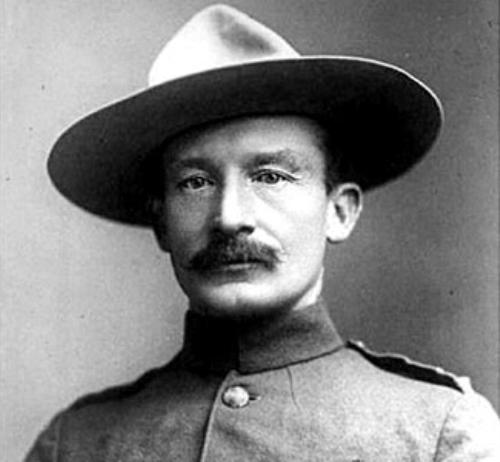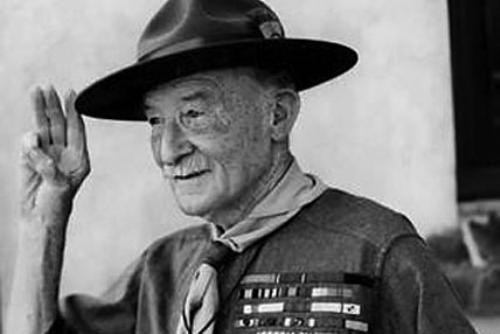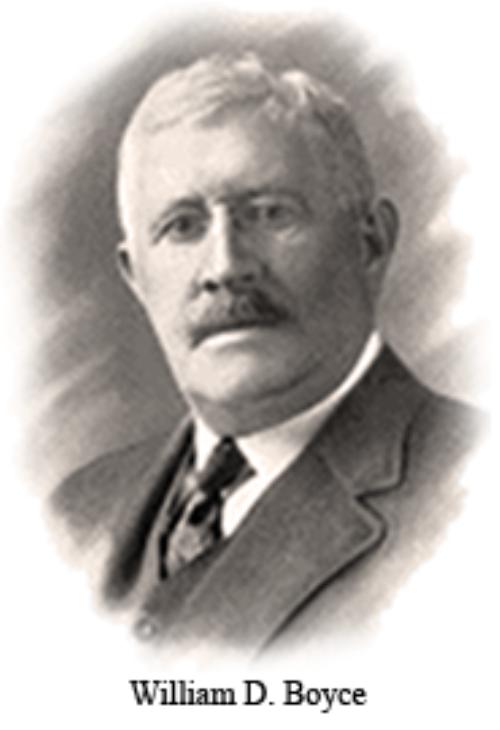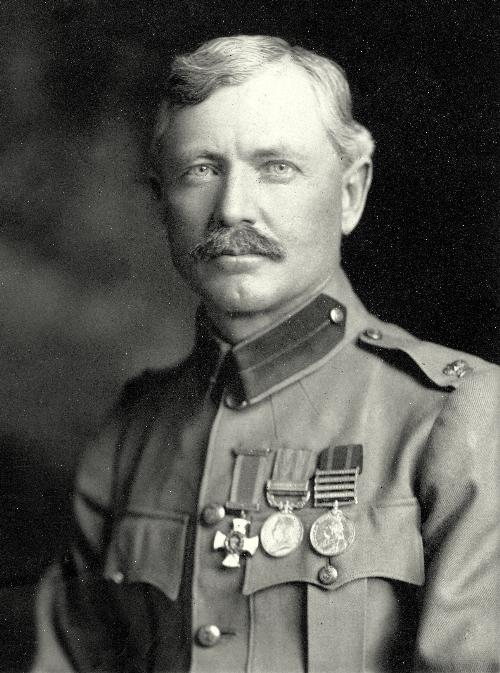 |
 |
Scouting began with Robert Stephenson Smyth Baden-Powell, also known as Lord Baden-Powell, who was born on February 22, 1857 in London. He is known as the founder and Chief Scout of the Scouting Movement.
His first introduction to Scouting skills was through stalking and cooking game while avoiding his teachers in the woods near his prestigious public school, which were strictly out-of-bounds.
He served in the British Army from 1876 until 1910, during in which he formed the basis for Scouting and the first Boy Scout program as part of England’s Boys' Brigade.
During one of his travels in the Army, he came across a large string of wooden beads, worn by the Zulu king, Dinizulu, which was later incorporated into the Wood Badge training program for Adult Leaders he started after he founded the Scouting Movement.
He met and befriended the American scout Frederick Russell Burnham in Africa, who introduced him to the American Old West and woodcraft. It was during that time that he wore his signature Stetson campaign hat and neckerchief for the first time.
Baden-Powell went to India in 1897 and returned to South Africa once again in 1903 prior to the Second Boer War and was engaged in further military actions against the Zulus. He organized the Legion of Frontiersmen to assist the regular army. While engaged in this, he was at Mafeking, the capital city of the North-West Province of South Africa, when it was surrounded by a Boer army, which had in excess of 8,000 men.
During the siege, the Mafeking Cadet Corps of white boys below fighting age stood guard, carried messages, assisted in hospitals, and so on. While stationed in Africa in 1903, Baden-Powell was introduced to the Mafeking Cadet Corps, a group of white boys below fighting age stood guard, carried messages, assisted in hospitals, and so on. He was sufficiently impressed with both their courage and the composure with which they performed their tasks to use them later as an object lesson in the first chapter of his book “Scouting for Boys”.
In August 1907 he held a camp on Brownsea Island to test out his ideas. About twenty boys attended: eight from local Boys' Brigade companies, and about twelve public school boys, mostly sons of his friends.
The first book on the Scout Movement, Baden-Powell's “Scouting for Boys” was published in six installments in 1908, and has sold approximately 150 million copies as the fourth best-selling book of the 20th century.
In 1910 Lieutenant-General Baden-Powell decided to retire from the Army to pursue the creation of The Scouts of England.
In 1920, the 1st World Scout Jamboree took place in Olympia near London, and Baden-Powell was acclaimed Chief Scout of the World.
Baden-Powell also had a positive impact on improvements in youth education. Under his dedicated command the world Scouting movement grew. By 1922 there were more than a million Scouts in 32 countries; by 1939 the number of Scouts was in excess of 3.3 million.
In 1909, Baden-Powell discovered the first Girl Scouts. The Girl Guide Movement was subsequently formalized in 1910 under the auspices of Baden-Powell's sister, Agnes Baden-Powell. Baden-Powell's friend Juliette Gordon Low was encouraged by Baden-Powell and his sister to bring the Movement to the United States, where she founded the Girl Scouts of the USA.
 |
 |
| Frederick Russell Burnham |
Robert Baden-Powell founded the Scouting Movement, but he was not personally responsible for the establishment of Boy Scouts of America.
Boy Scouting was brought to the United States by William D. Boyce. Boyce was a multi-millionaire who had taken a step back from his businesses to pursue his interests in civic affairs, devoting more time to traveling and participating in expeditions.
In 1909, he embarked on a two-month trip to Europe. Boyce learned about Scouting while passing through London during his first expedition to Africa in 1909.
Upon his return to the United States, he incorporated the Boy Scouts of America on February 8, 1910.
The Boy Scouts of America was chartered by Congress on June 15, 1916. This is the same year as the first Boy Scout Council in Arizona was formed in Prescott.
Frederick Russell Burnham, the American scout that Baden-Powell befriended in Africa, served as the Honorary President of the Arizona Boy Scouts throughout the 1940s until his death in 1947.
The first two Boy Scout troops in Arizona Territory were organized in Prescott, in September 1910 and in Tombstone at almost the same time. Scouting came to Phoenix in the fall of 1910. Other scout troops were formed; in Bisbee in early 1911. and in St. Joseph and Snowflake about the same time.
In April 1921 the eight LDS troops in the Maricopa (LDS) Stake and the Methodist troop met at the Coffee Cup in Mesa to organize the Apache Council. This was the second council in Arizona.
On September 16, 1921 the board of the Apache Council met with scouters from Phoenix at the Tempe National Bank to reorganize into the Theodore Roosevelt Council, to be headquartered in Phoenix. In 1993 the Theodore Roosevelt Council (located in Phoenix) and the Grand Canyon Council (located in Flagstaff) merged with the Phoenix council assuming the current name, the Grand Canyon Council.
On August 9, 1937 at 81 years old, Baden-Powell gave his farewell to Scouting at the 5th World Scout Jamboree, and retired from public Scouting life.
In his final letter to the Scouts, Baden-Powell wrote:
"…I have had a most happy life and I want each one of you to have a happy life too. I believe that God put us in this jolly world to be happy and enjoy life. Happiness does not come from being rich, nor merely being successful in your career, nor by self-indulgence. One step towards happiness is to make yourself healthy and strong while you are a boy, so that you can be useful and so you can enjoy life when you are a man. Nature study will show you how full of beautiful and wonderful things God has made the world for you to enjoy. Be contented with what you have got and make the best of it. Look on the bright side of things instead of the gloomy one. But the real way to get happiness is by giving out happiness to other people. Try and leave this world a little better than you found it and when your turn comes to die, you can die happy in feeling that at any rate you have not wasted your time but have done your best. 'Be Prepared' in this way, to live happy and to die happy — stick to your Scout Promise always — even after you have ceased to be a boy — and God help you to do it."